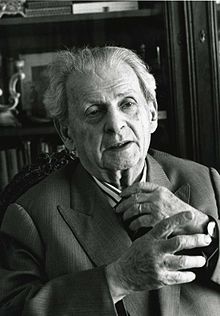Immanuel Levinas
| Emmanuel Levinas | |
|---|---|
 |
|
| Born |
12 January 1906, O.S. 30 December 1905 Kovno, Russian Empire (present-day Kaunas, Lithuania) |
| Died | 25 December 1995 (aged 89) Paris, France |
| Alma mater |
University of Freiburg (no degree) University of Strasbourg (Dr, 1929) University of Paris (DrE, 1961) |
| Era | 20th-century philosophy |
| Region | Western Philosophy |
| School | Existential phenomenology |
| Institutions |
University of Poitiers University of Paris University of Fribourg |
|
Main interests
|
Existential phenomenology Talmudic studies Ethics · Ontology |
|
Notable ideas
|
"The Other" · "The Face" |
|
Influences
|
|
|
Influenced
|
|
Emmanuel Levinas (French: [ɛmanɥɛl ləvinas]; 12 January 1906 – 25 December 1995) was a French philosopher of Lithuanian Jewish ancestry who is known for his work related to Jewish philosophy, existentialism, ethics, Phenomenology and ontology.
Emmanuelis Levinas (later adapted to French orthography as Emmanuel Levinas) was born in 1906 into a middle-class Litvak family in Kaunas, Lithuania. Because of the disruptions of World War I, the family moved to Charkow in Ukraine in 1916, where they stayed during the Russian revolutions of February and October 1917. In 1920 his family returned to Lithuania. Levinas's early education was in secular, Russian-language schools in Kaunas and Charkow. Upon his family's return to Lithuania, Levinas spent two years at a Jewish gymnasium before departing for France, where he commenced his university education.
Levinas began his philosophical studies at the University of Strasbourg in 1924, where he began his lifelong friendship with the French philosopher Maurice Blanchot. In 1928, he went to the University of Freiburg for two semesters to study phenomenology under Edmund Husserl. At Freiburg he also met Martin Heidegger. Levinas would in the early 1930s be one of the very first French intellectuals to draw attention to Heidegger and Husserl by translating in 1931 Husserl's Cartesian Meditations (with the help of Gabrielle Peiffer and with advice from Alexandre Koyré) and by drawing on their ideas in his own philosophy, in works such as La théorie de l'intuition dans la phénoménologie de Husserl (The Theory of Intuition in Husserl's Phenomenology; his 1929/30 doctoral thesis), De l'Existence à l'Existant (From Existence to Existents; 1947), and En Découvrant l’Existence avec Husserl et Heidegger (Discovering Existence with Husserl and Heidegger; first edition, 1949, with additions, 1967). In 1929 he was awarded his doctorate (Doctorat d'université degree) by the University of Strasbourg for his thesis on the meaning of intuition in the philosophy of Husserl, published in 1930.
...
Wikipedia
